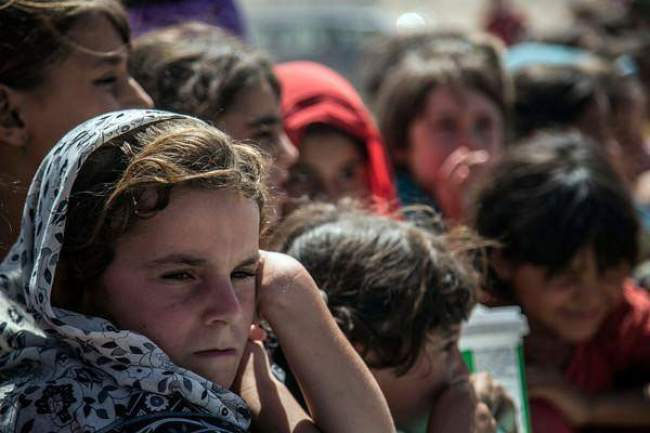Political impasse adds 'new layer of complications' to Iraq's complex challenges – UN envoy
| Publisher | UN News Service |
| Publication Date | 6 May 2016 |
| Cite as | UN News Service, Political impasse adds 'new layer of complications' to Iraq's complex challenges – UN envoy, 6 May 2016, available at: https://www.refworld.org/docid/573026bd40b.html [accessed 19 May 2023] |
| Disclaimer | This is not a UNHCR publication. UNHCR is not responsible for, nor does it necessarily endorse, its content. Any views expressed are solely those of the author or publisher and do not necessarily reflect those of UNHCR, the United Nations or its Member States. |
6 May 2016 - A profound political crisis has engulfed Iraq, adding "a new layer of complications to the already complex set of military, security, humanitarian, economic and human rights challenges," the United Nations envoy for the country warned today, urging the Government, constitutional and political leaders, and civil society to work together to break the impasse and advance reforms.
"A business as usual approach simply will not be enough for the people," Ján Kubiš, the Secretary-General's Special Representative for Iraq, said in his periodic briefing to the Security Council. "They want genuine change that will improve their lives."
Failure of Iraq's Government and political cAt this stage, the situation remains unpredictable and could unfold in many different directionslass to agree on genuine reforms prompted demonstrators to request reform of the whole government and political process, abandoning of the ethnic and sectarian quota approach that is in the fundament of the Iraq political system since 2003, the envoy explained.
In April, demonstrators breached the entry checkpoints of the Green Zone and stormed Parliament building, bringing paralysis and deadlock in the work of the Government and the Council of Representatives.
Acts of vandalism and attacks on some members of Parliament sadly broke with the practice of many months of peaceful protests, he said.
"At this stage, the situation remains unpredictable and could unfold in many different directions," he warned, noting that protests are set to continue as solutions discussed among the political class may not be enough for the people of Iraq.
Failing to promote genuine reforms and resume the work of the Council of Representatives will only serve the interest of Iraq's real enemies - a terrorist group known as the Islamic State in Iraq and the Levant (ISIL/Da'esh), he said.
Expressing concern about reports of ISIL's use of weaponized chemicals in its attacks on civilians and security force personnel in Bashir, he called on the international community to support the ongoing investigation into these incidents and to ensure accountability of anyone found to be involved in the use of weaponised chemicals.
Civilians in Fallujah, Iraq, are at extreme risk and need urgent help. Photo: OCHA Iraq
He also condemned the continued killings, kidnapping, rape and torture of Iraqis by ISIL, which may constitute crimes against humanity, war crimes and even genocide.
Iraq's political groups must find together a solution based on the Constitution, law and principles of democracy that will respond to the needs of the people, put an end to the split and paralysis in Parliament, and enable the rapid enactment of the necessary reforms and anti-corruption measures, and the smooth functioning of State institutions without threat or intimidation, Mr. Kubiš said.
The recent resumption of contacts and dialogue between Baghdad and Erbil, the capital of Iraqi Kurdistan, should be turned into a genuine partnership of mutually-beneficial cooperation, he said. Reconciling differences and working together on the necessary reforms will create conditions for enhanced financial and technical support by the international community to Iraq, including the Kurdistan region.
It is imperative that both Baghdad and Erbil remain committed to reaching an understanding on oil exports and revenue-sharing, on Peshmerga salaries and on other outstanding issues, including those that concerns situation in the liberated and disputed areas.
Iraq's humanitarian crisis remains one of the world's worst
On the humanitarian situation, he said Iraq faces one of the world's worst crises. In the last year, the number of Iraqis in need has doubled to nearly a third of the population - over ten million people.
Military campaigns, depending on scope and intensity, will almost certainly lead to mass displacement in the months ahead. In a worst case scenario, more than 2 million more Iraqis may be newly displaced by the end of the year, he said.
The 2016 Humanitarian Response Plan requests $861 million to provide life-saving assistance to seven million Iraqis. Disappointingly, only a quarter of this amount has been secured thus far. Unless $300 million is received by June, key front-line life-saving programmes will be cut-back or closed.
Turning to the issue of missing Kuwaiti people and property, he said that the UN Assistance Mission for Iraq (UNAMI) will be reaching out to different stakeholders to seek their assistance in various aspects that will push the process forward.
However, the main responsibility in ensuring advancement lies with the Government of Iraq. "While we remain cognisant of the sheer volume of challenges that Iraq is currently facing, its international obligations have to be fulfilled and this issue cannot fall by the wayside," he said.

